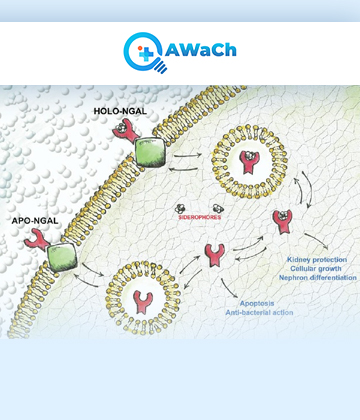Neutrophil gelatinase-associated Lipocalin
Neutrophil Gelatinase Associated Lipocalin is a protein that is primarily expressed in neutrophils, a type of white blood cell, as well as other cells such as kidney tubular cells.
One of the well-known applications of Neutrophil Gelatinase Associated Lipocalin is in the early diagnosis and monitoring of acute kidney injury (AKI). NGAL levels increase rapidly in response to kidney injury and can be detected in blood and urine. Measurement of uNGAL levels can aid in the early detection and prediction of AKI, facilitating prompt intervention and management. NGAL has also been studied in other conditions Neutrophil gelatinase-associated Lipocalin, such as cardiovascular diseases, sepsis, and various types of cancer. Its association with inflammation and tissue damage makes it a potential biomarker for assessing disease severity and prognosis. Research is ongoing to explore the full range of NGAL's functions and its potential as a diagnostic and therapeutic target in various medical conditions.
What is Neutrophil gelatinase-associated Lipocalin ?
In summary, Neutrophil Gelatinase-Associated Lipocalin (NGAL) is a significant biomarker, particularly in the context of kidney injury. Its early detection capabilities offer healthcare professionals an important tool for identifying kidney damage promptly and initiating appropriate interventions. NGAL serves as an early marker of kidney injury or insult. It is released in response to kidney damage, even before traditional markers like serum creatinine show significant changes. This makes NGAL particularly valuable for early detection of acute kidney injury (AKI).

Neutrophil gelatinase-associated lipocalin (NGAL) is a protein primarily expressed in neutrophils, a type of white blood cell, and other cells like kidney tubular cells. NGAL plays a crucial role in various physiological and pathological processes, particularly in inflammation, infection, and kidney injury. As a member of the lipocalin protein family, NGAL can bind to different ligands, including iron-containing siderophores, bacterial lipopolysaccharides, and specific matrix metalloproteinases (MMPs). This binding ability contributes to its role in modulating the immune response and tissue remodeling.
Strength:
NGAL's strength stems from its role as a significant biomarker, especially in the context of kidney injury. It acts as an early indicator of kidney injury or insult, releasing in response to kidney damage even before traditional markers like serum creatinine exhibit significant changes. This early detection capability is invaluable for promptly identifying acute kidney injury (AKI) and initiating appropriate interventions.
Advantages:
NGAL has advantages, including its rapid response to kidney injury, which renders it a valuable tool for early detection and prediction of AKI. This timely detection enables swift medical intervention and management, potentially improving patient outcomes. NGAL's association with inflammation and tissue damage also positions it as a potential biomarker for assessing disease severity and prognosis in conditions beyond kidney injury.
Recognitions:
NGAL is recognized for its pivotal role in the early diagnosis and monitoring of AKI. Its using as a biomarker has significantly contributed to healthcare professionals' ability to identify kidney damage promptly and provide timely care.
Innovation:
Ongoing research continues to explore the full range of NGAL's functions and its potential as a diagnostic and therapeutic target in various medical conditions. NGAL represents an innovative approach to early disease detection, particularly in the context of kidney injury, where early intervention can have a substantial impact on patient outcomes.
